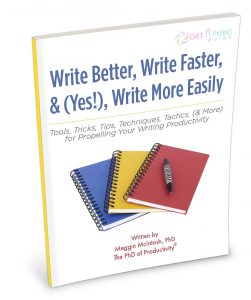Quick (and Easy) Tips for Writing Productively by Meggin McIntosh, PhD
 Tips are usually little quick and easy ideas – and that’s just what I have here for you this week. All of these can be implemented without a bunch of muss and fuss.
Tips are usually little quick and easy ideas – and that’s just what I have here for you this week. All of these can be implemented without a bunch of muss and fuss.
-
Set aside time. Exactly how do you think you’re going to get your writing done if you don’t write? And how do you think you’re going to write if you don’t protect spaces for that writing? Block time to write instead of blocking the need to write (or waiting for a block of time to write). Set aside the appropriate amount of time you need and want to write.
-
Write with a partner. This may involve collaborating on a writing project or just conducting “parallel writing” (like children engaged in parallel play). The two of you may just hold each other accountable on your individual projects or you may actually be writing together on the same project. Find a like-minded individual who is also committed to getting his/her writing completed.
-
Turn off your email. Answering email is not writing. Don’t pretend it is or that it’s just getting you “warmed up” for your “real” writing. It’s not. It’s email. Turn it off and get real writing done.
-
Sit where you have nothing else to do. When you are sitting at a game, sitting in the car, sitting on a plane, sitting and waiting your turn at the Department of Motor Vehicles, you have nothing else (productive) to do. Always have paper and a pen/pencil (or your computer).
-
Limit interruptions. Although breaking your writing down into manageable chunks is wise, writing in fits and starts due to interruptions is a maddening and less-than-productive practice. Do everything within your power to limit all potential interruptions. You are an adult and you know what has the potential to interrupt you. Take charge.
-
Write like you talk; if you talk smart, write smart. There are a multitude of mavens (like me) who give advice about writing. Many say that you should write so that a sixth grader could read it. Indeed, if you are writing for 6th, 7th, or 8th graders (or those whose reading comprehension is at the middle school level), then by all means, write at their level. If you write for people with a high IQ and significant reading comprehension skills, then feel free to purposely direct your writing to that audience.
-
Separate editing and composing. You will significantly increase your writing productivity (as measured by quantity and quality) when you separate the time you edit from the time you compose. Different parts of your brain are engaged when you are in the composing stage and when you are in the editing phase.
-
Read what you’ve written out loud. Although most writing (other than plays or poetry) is meant to be read to oneself, reading your fiction or informational text aloud helps you find errors and refine the flow of your text.
-
Send your writing to someone else you trust and ask him/her to add to your ideas. You can do this with a colleague, a friend, and/or someone you pay for this assistance. When you reach the point of frustration or feel like you have come to a dead zone, send the piece off to someone who can read what what you have written and add a few ideas here and there (or correct and refine what you had generated).
-
View writing as part of what all professionals do. And you’re a professional, aren’t you? Don’t view writing as something particularly unique. Whenever we see something as being difficult and unusual, we tend to shy away from it. If you view writing as a normal endeavor, then you can approach it in the same way you engage in other aspects of your work.
There is not one of these ten tips that will take you weeks to implement. They don’t require that you spend money, call a committee meeting, or otherwise drag out implementation. So…get going.
© Meggin McIntosh, PhD (also known as “The PhD of Productivity”®). One of the ways that you can learn from Meggin about productive writing is through her 30 Articles in Just 30 Days program (www.30ArticlesinJust30Days.com).
 Whether you write for pleasure, to discover, to get paid, as a part of your work, as a way to instruct, or for any other purpose, streamlining your writing process is essential. The Get a Plan! Guide® to Writing Better, Faster, & (Yes!) More Easily: Tools, Tricks, Tips, Techniques, Tactics, & More for Propelling Your Writing Productivity.
Whether you write for pleasure, to discover, to get paid, as a part of your work, as a way to instruct, or for any other purpose, streamlining your writing process is essential. The Get a Plan! Guide® to Writing Better, Faster, & (Yes!) More Easily: Tools, Tricks, Tips, Techniques, Tactics, & More for Propelling Your Writing Productivity.
Inside this essential Get a Plan! Guide, you’ll find nearly 70 practical, easy-to-implement ideas that will propel your writing productivity.




